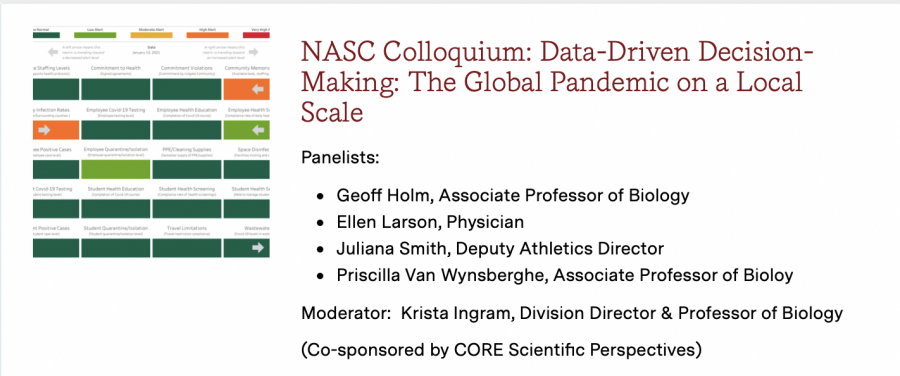NASC Colloquium Engages Students With Natural Sciences
Many departments offer division colloquia in order to give students the opportunity to engage with different subjects outside of the classroom. The Division of Natural Sciences and Mathematics holds the NASC Colloquium every other week, focusing on topics related to current research in the natural sciences.
The NASC Colloquium is coordinated by Eric Muller, assistant professor of chemistry, and Will Cipolli, assistant professor of mathematics. The coordinators cycle every two years in order to cycle in fresh perspectives and ensure that the lectures cover a wide variety of topics.
Speakers for the colloquium are selected by the co-coordinators from a pool of recommendations from professors within the division. Since the goal of the colloquium is to attract students from all subjects under the natural sciences and mathematics umbrella, speakers typically have interdisciplinary aspects of their research.
“I think we all have a common goal of inviting speakers who are interdisciplinary, doing new exciting work on interesting topics that can give Colgate students a broader sense of the field of science outside of your exposure at Colgate,” Muller said.
Muller takes pride in his position as co-coordinator because he views the colloquium as a way to connect students to the real-world applications of what they’re learning in their courses.
“I can think back to being a student myself, and classes were difficult. I learned a lot in class, [but] it’s not always easy from a specialized class to see the bigger picture of how things tie together … And so as a student I found it really engaging to go to colloquia and say, ‘Wow, there’s all this cool research going on in the world.’ And I would have no idea if I just read a textbook or went to class.”
Anne Perring, assistant professor of chemistry, also praised the interdisciplinary nature of the colloquium.
“There’s a value to putting science into a societal context. And if you’re trying to draw in professors and students from biology and physics and chemistry and geology and environmental science … if you want to draw them all to the same talk, which is the point of the colloquium, you have to have somebody who’s a fairly interdisciplinary person to begin with,” she said. “We’re looking to expose ourselves and our students to research that we don’t do in-house that might be of interest … For the colloquia, we look for something that has a bit more broad appeal and a speaker that can be a little bit more big picture.”
Perring recommended Lauren Oakes, one of the most recent speakers the colloquium hosted. Oakes is a professor of earth system science at Stanford University, and her presentation focused on the importance of connecting the scientific with the “creative/communicative.”
While most departments have their own colloquia, the division-wide NASC Colloquium is distinct in its purpose of providing a more interdisciplinary and accessible approach to the natural sciences.
“From the perspective of a department, like the chemistry department, we’re bringing in significantly more specialized speakers and that they’re all probably related to the field of chemistry … [But] in the NASC Colloquium, we’re trying to give a sense of the wide range of things that represent modern scientific research and applications of modern scientific research,” Muller said.
Hosting about eight speakers per semester, the NASC Colloquium brings in speakers from most departments within the wider natural sciences and mathematics division.
“The coffee afterward can be a great way to spark a new collaboration, where you’re, you know, you’re working with someone who has skills that are different than yours, which makes what you can do together so much stronger. And as students, I think, seeing what they’re learning applied is really important,” Perring said.
Although the COVID-19 pandemic and the shift to virtual lectures has made the coffee portion of the colloquia a thing of the past, the virtual talks still allow communication between people who specialize in different subjects and connect the scientific community.
“In a regular semester, there’s also a chance sometimes to maybe catch the speaker afterward and be able to ask a question, [and] I think we are able to replicate a lot of that with Zoom,” Muller says. The Q&A section and other functions within Zoom have allowed students and faculty to interact with the speakers and gain more insight into their research.
The new virtual format has brought some positives. In years prior, budgetary constraints limited the number of outside speakers the colloquium could host per semester. With travel taken out of the equation, coordinators have been able to bring in speakers from across the country. Another perk of the online lectures is the increase in accessibility for students.
“Not everyone has 3:30 to 4:30 available on their schedule every week … because everything’s online, there’s at least a chance of being able to come and you don’t have to make it all the way up to Ho 101 where you would normally hold a colloquium. But you can just, you know, hit that Zoom button, dial in,” Muller said.
Recordings of the lectures are also available online on the Division of Natural Sciences and Mathematics page, allowing students to watch at their own pace if they still can’t make the colloquium, which Muller says has helped bring a bigger audience to the lectures.
The colloquium typically hosts a mix of Colgate professors and outside speakers. While outside speakers are exciting and help to expand students’ understanding of the natural sciences, speakers from within the Colgate NASC departments also benefit students.
“There are a lot of interesting things being done on campus by my professors and I think that as a science student it’s a very good idea to be aware of those, not only because you would probably learn a lot about something new, but because at some point you’re going to have opportunities to actually go and engage in that research,” Facundo Pérez, a first year planning to major in astronomy and physics, said.
Krista Ingram, director of the Division of Natural Sciences & Mathematics here at Colgate, is currently organizing a panel on COVID-19 to take place later this month. Muller speaks to the importance of having such relevant discussions.
“It’s also nice in a colloquium that you get to talk about topical things. You know, what is research going on right now, this week, that is affecting all of our lives?”
The next lecture in the NASC Colloquium will take place on Friday, March 5, and will feature Johnna Frierson, Assistant Dean of Graduate Postdoctoral Diversity & Inclusion at the Duke University School of Medicine. She will discuss how to combat bias in STEM industries.

Sophie Naylor is a junior from Middletown, CT studying geology, geography and Arabic. She has previously served as a staff writer for the Baker’s Dozen...








